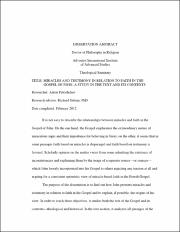Miracles and testimony in relation to faith in the gospel of John : a study in the text and its contexts
Abstract
It is not easy to describe the relationships between miracles and faith in the
Gospel of John. On the one hand, the Gospel emphasizes the extraordinary nature of
miraculous signs and their importance for believing in Jesus; on the other, it seems that in
some passages faith based on miracles is disparaged and faith based on testimony is
favored. Scholarly opinion on the matter varies from some admitting the existence of
inconsistencies and explaining them by the usage of a separate source—or sources—
which John loosely incorporated into his Gospel to others rejecting any tension at all and
arguing for a consistent optimistic view of miracle-based faith in the Fourth Gospel.
The purpose of the dissertation is to find out how John presents miracles and
testimony in relation to faith in his Gospel and to explain, if possible, the origins of his
view. In order to reach these objectives, it studies both the text of the Gospel and its
contexts—theological and historical. In the text section, it analyzes all passages of the
Fourth Gospel in which miracles and/or testimony are related to faith. In the context part,
it surveys literature sources which might serve as background for the Gospel of John in
its historical situation; these include the Old Testament, selected Second Temple
literature, Greco-Roman literature, and rabbinic traditions.
The study concludes that John does not belittle the value of faith that comes from
seeing miracles; neither does he state that miracles are indispensable for believing. The
Gospel shows both miracles and testimony as a means (although not always effective) to
produce and strengthen faith, with the former being a content as well as a substantiation
for the latter. However, John does not justify the absence of faith by the absence of
miracles; instead, he claims the necessity of faith grounded only in testimony, faith
without seeing, in the situation of the second and third generations where those are
scarce. Such a view is not an invention of the author of the Fourth Gospel; it can be found
in some Jewish sources, and even more so in the Exodus narrative of the Old Testament.


